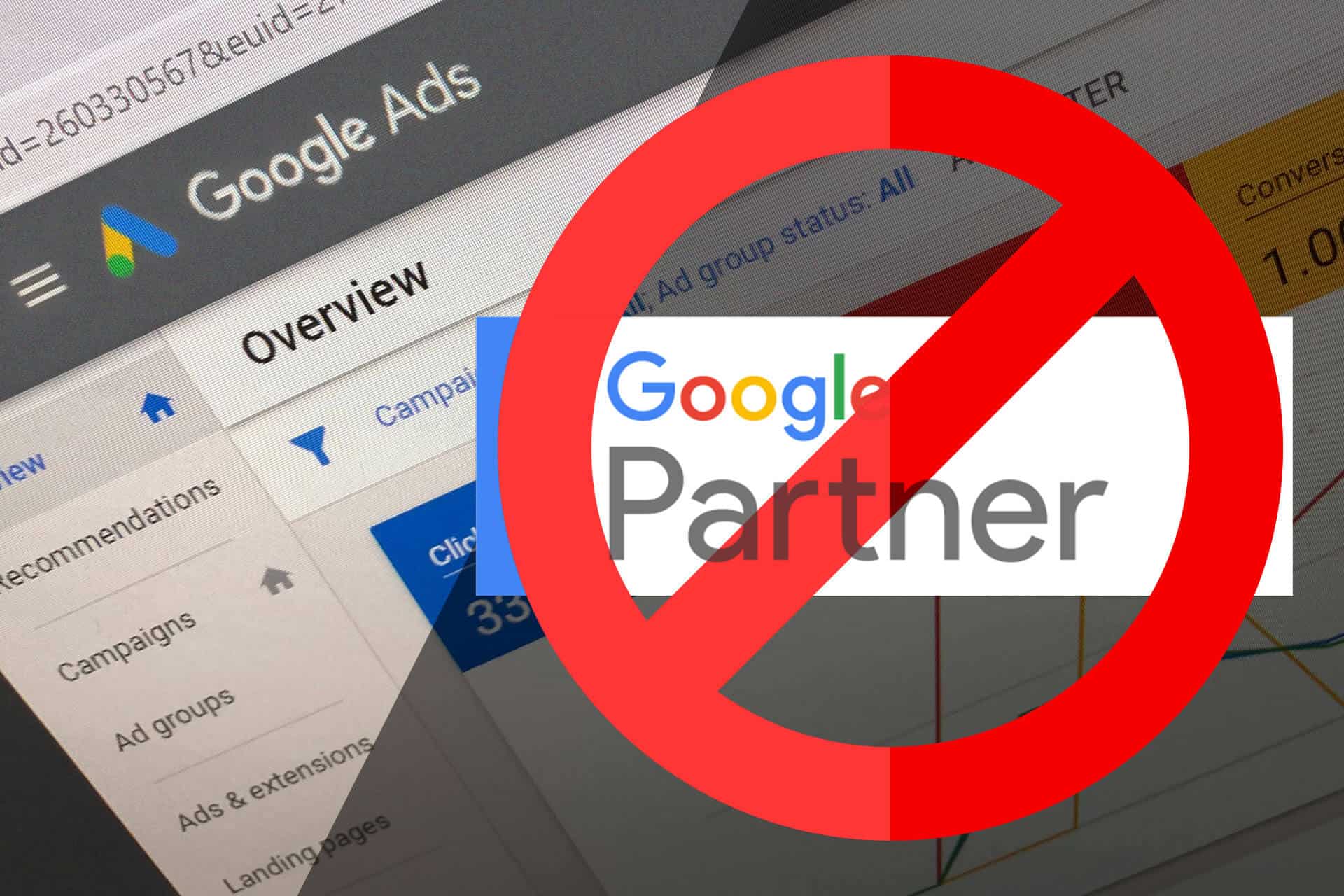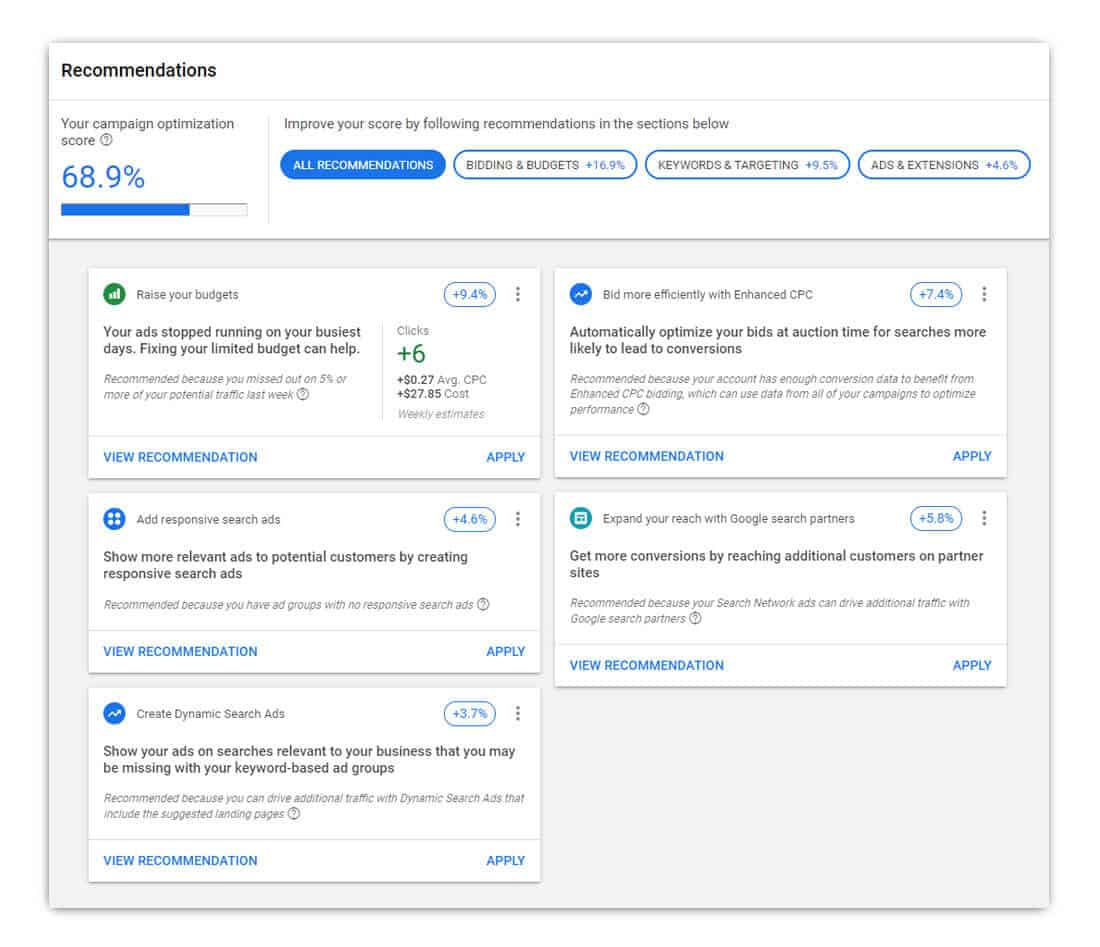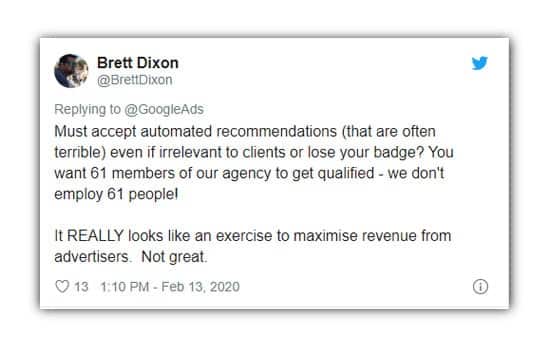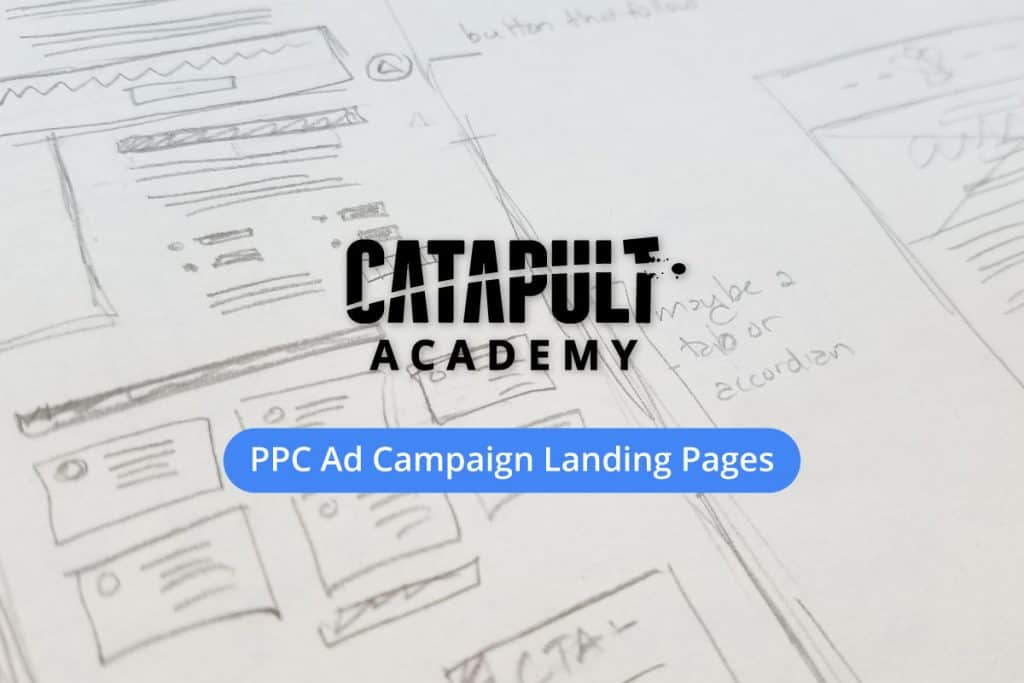The Google Partner Program is Changing Its Requirements and Agencies Like Us Are Not Happy
The Google Partner Program used to be a way for businesses to distinguish who was a legitimate Google advertiser and who was not. This has recently all changed.
The new requirements into the Partner program diminishes the purpose of trusting a certified PPC specialist to manage online ads on the most widely used search engine in the world. And more importantly, it diminishes the trust we have in Google as a whole.
What used to be a positive reinforcement for the good work Catapult and other advertisers do for our clients has proven that Google is using its monopolistic influence to increase profits at the expense of businessowners by dangling the Partners program in the face of PPC agencies.
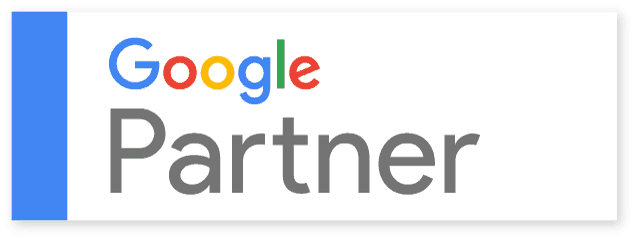
For Context, Let Us Break Down Exactly What the Google Partner Program Is
For years, the Google Partner Program was a way for online advertisers to display their credibility and expertise in creating and managing Google Ad accounts for clients of all industries.
Companies – like ours – were proud of their hard work and success in Google Ads and proudly displayed the badge on their website, business cards, and really anywhere that a person could see. It was a distinguishable achievement.
To be considered a Google Partner, you were required to complete the following:
- Have a total ad spend of $10,000 or more within a 90-day range.
- Have at least 1 Google Ads certified user – a person who has taken the Google Ads exam and passed the tests with a minimum score of 80
- Meet the performance requirement by delivering solid overall ad revenue and growth, and maintaining and growing your customer base.
In other words, advertising companies had to help grow their clients’ customer base and revenue by producing quality ads that got results.
This helped businessowners who didn’t have the time or expertise to manage Google Ads themselves while growing their business for a fraction of the cost of traditional advertising!
Seems fair enough, right? Yes, it is extremely fair.
Okay, So What Changed?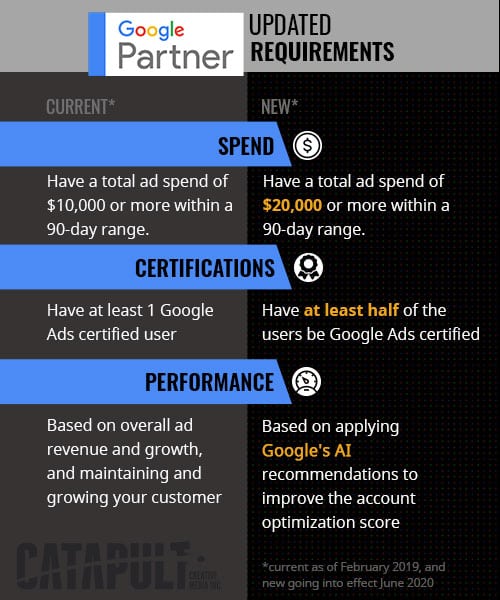
On February 12, 2020, Google Partners sent an email to most advertisers (including yours truly) with a special announcement that big changes were coming.
And BIG changes they were.
At the end of June 2020, to be considered a Google Partner, advertising agencies must complete the following:
- Have a total spend of $20,000 or more within a 90-day range (okay that’s fair)
- Agencies will need to have at least half of the users in the managing Google Ads account to be Google Ads certified (hmm, this could be a problem if we have to require clients to get certified)
- Meet the performance requirement by applying Google Ad’s AI recommendations to improve your account performance and optimization score (woah hold on now….)
Now, for a non-advertiser might be thinking “okay, so what? If Google suggests it, it’s probably a good thing to do anyway.”
But to the rest of us, this was a shocking and alarming discovery. Why would this be alarming to advertisers you may ask?
Google’s recommendations are centered around Google AI automation – most of which would not benefit our clients and make them spend more money than they actually need or want to.
If the PPC advertiser does not follow Google’s recommendations, their agency will no longer be considered a distinguished Google Partner.
The Changes to the Google Partner Program Requirements Diminishes the Overall Goal for Online Advertising
Now, you must understand that with almost any changes or updates to a program or app, there is always a little bit of resistance at first (remember how wild everyone went whenever Snapchat changed its layout in 2017? What a time).
However, this is not a layout change or even a feature update. Google Ads got rid of a few key metrics from its platform already, and advertisers let it slide, but not without a few complaints.
But now, Google Ads has crossed a line. The mega advertising hub no longer considers successful account and campaign performances as beneficial.
The changes to the Google Partner requirements have warped the entire integrity of online advertising, and what it means to be an actual PPC specialist.
It breaks away from the platform’s goal of helping small businesses fairly compete with the big corporations in search. The success of our clients’ ads came down to the expertise of the PPC manager (and maybe a few other contributing factors).
Rather than using our capabilities and expertise to optimize clients’ campaigns to generate as much revenue for their businesses as possible, we are now forced to follow Google’s account recommendations to maintain our current Partner status.
Advertisers who have no clue how to properly manage a Google Ads account can also be considered a Google Partner as long as they simply do what Google says, which can be a major problem when choosing a PPC agency.
After all, wouldn’t a company trust their money with an advertising specialist that understands how to build successful campaigns through knowledge and experience than someone that blindly follows the instructions?
It is like the difference between a person who paints a masterpiece and another person that does paint-by-numbers.
In other words, the new Google Partner badge will not equate that the advertising company actually knows what it’s doing anymore, and businesses are the ones who will suffer (and guess who benefits from a business losing out on a lot of money? Yup, Google itself).
Why Catapult Creative Media Will Not Be a Google Partner After June 2020
First and foremost, I must say that I take great pride in being a PPC specialist. It is a profession that many do not understand or are quick to assume that we steal people’s information or waste companies’ money with spammy advertisements.
This is far from the truth. We help honest business owners get their brand in front of people who are looking for the products and services they offer online.
From research to implementation to ongoing management, everything we do is to provide clients with the best return on investment (ROI) as possible.
Now with that being said, with every new feature, update, or change that Google Ads, Microsoft Advertising, or any social media platform announces, my first concern is how this will affect my clients.
When I broke the news about the Google Partner program to the rest of the agency, no one spoke. Our Brand Strategist, David Maples, looked lost for words, and the man can talk to anyone about anything for hours.
All the certified Google Ads advertisers at Catapult tried to come up with a solution where we can retain our Google Partner status while also continuing to serve our clients’ best interest.
Collectively, we felt Google’s push to adopt the new requirements tainted the playing field and is designed to benefit one entity: Google.
Our drive to be good advocates for our clients and values as a company would be at odds with this new Partner benchmark. If we decided a recommendation would benefit the client, we would accept it, but for that sole purpose only.
But we want to make one thing very clear: It is not a concern of whether we can meet the optimization score threshold, it is a concern of Google not having any of our best interests in mind.
When the new Google Partner Program rolls out late June of 2020, we will take our old Google Partner badge down, mourn a little, and then proudly operate our PPC accounts as usual, with our clients’ results as our main focus.
“If the Google Partner Update is So Bad for Everyone, Why Does Catapult Care About Losing the Status?”
I’m assuming you’re asking this great question (even if you aren’t, I’ll answer it anyway).
While many other PPC specialists are in the same boat with how wrong the new requirements are, the simple reason we want to be a Google Partner is because it looks bad for business if we are not.
How? Think about it, if you were going to pay an ad agency to manage your online advertisements and generate more business, wouldn’t you want them to be certified on the platform they’re using?
The reality is that many businessowners do want qualified advertisers, and that badge was a way to pick out the qualified ones. And Google knows this is important for us to qualify ourselves as reliable online advertisers.
While most Google Ads managers like myself are all internally and externally screaming about the injustice, majority of everyone else’s worlds are still turning without any concern.
Business owners will still see the badge as a qualifier, but in return, they could end up with an agency that requires the client to spend more for wasteful clicks with overinflated costs per click and putting ads in front of users who are not looking to make a purchase.
That is not to say more non-online advertisers need to be just as mad as we are, but rather understand why many of us would rather put the success of our clients’ online advertising success first than stroke the egos of those in charge of Google Ads for a badge to put on our website.
This Stance Is Not Just About Us – It Is Also for All the PPC Agencies Out There Who Could Suffer As a Result to the Performance Score Change
My agency is lucky and we do not have to be a Google Partner to generate majority of our clients (in other words, PPC management is not our main service).
However, there are thousands of PPC management agencies across the country that rely on their Google Partner or Google Premier status to generate a steady client base in a highly competitive industry.
Successful PPC specialists will be forced to choose between retaining more control of their clients’ ads on Google or allowing the mega-tech corporation to have full control over funneling more money to themselves.
That is simply not right. In fact, it is cruel and potentially detrimental to a company that has truly talented advertisers with their own methods for successful campaigns.
“There’s No Way Google Would Be So Obvious in Caring More About Money Than the People They Take It From…. Right?”
Wrong.
That is exactly what is happening. Plain and simple, Google is a monopoly that has gotten away with too much for too long.
Remember when Google removed its motto “Don’t Be Evil” from its company handbook in April of 2018? We certainly don’t.
The company that was founded to provide users the best and most accurate search results on the interest is taking advantage of the influence they have over both searchers and search engine marketing (SEM) agencies for larger profit margins.
When you have the power to control what the majority of the internet searchers see and control the majority of the platforms they use, not many people can stop you from showing people exactly what you want them to see.
Additionally, Google does not make money from having billions of users on its search engine or clicks on organic search results, the company profits from the users clicking on paid search ads.
The more clicks the ads they generate – regardless of whether the ad produces an actual lead to the client or not – Google still gets paid. So, if Google puts ads in front of users who have no intention of making a sale and the ad is accidentally clicked (it happens), Google makes a profit and the client’s budget is wasted.
I got my job at Catapult because I was able to take any budget that a client gave us and create very successful ad campaigns. That is because I had full control of every keyword, bid, ad copy, and coverage.
There was nothing that we at Catapult were doing incorrectly. In fact, our clients ended up saving money with higher ROIs without any Google automations or suggestions. Everything we did was done manually and for the benefit of our clients.
So, if how we run our ad accounts actually benefits the client better than Google’s AI automation, then why is the tech giant enforcing us to comply with its “recommendations” to retain our Google Partners status (something that is an important sales tool for us)?
It’s Time to Take a Stand Against the New Age of Google
PPC specialists are creative builders that trust their skills and talent to build successful advertisements. We do not need an AI system to tell us what is right or wrong when we know what is best for a campaign and for the client.
That is because we are advocates for our clients. We know what their wants, needs, and goals are that AI technology and authoritarian corporations cannot simply understand.
For the reasons I have laid out, all of us at Catapult Creative Media are taking a stand against Google’s insatiable need to control everything on the internet and will not be accepting Google Ad’s recommendations for any of our campaigns if we believe it will not improve the performance of a campaign.
We know there are thousands of agencies across the globe just like us who are equally as outraged (follow the hashtag #ppcchat on Twitter for the latest scoop) and have taken a stand as well.
And for our clients, we hope they will understand that we care more about using their money in the most productive way possible than the badge from Google. Google Partner or not, come June 2020, our capabilities will be the same as they always have been.
We are online advertisers that put our clients first and ourselves second. Our clients are the reasons we exist and we want to do the right thing for them. That has always been our motivation with managing clients’ online advertising and that will never change.
Ashley Boudreaux is a Digital Analyst for Catapult Creative Media. She is an LSU graduate with a B.A. in Mass Communication and a minor in French. In her free time, she enjoys visiting petting zoos and climbing trees.
Work with Catapult Creative Media Inc. Catapult Creative Media Inc. is a digital marketing and design agency serving clients over the United States but is proud to call Baton Rouge, Louisiana home. Founded in 2007, Catapult provides digital, social and mobile marketing solutions backed by relevant strategy and measurable results. Catapult works the web to their clients’ advantage, launching them to their next level of success.

